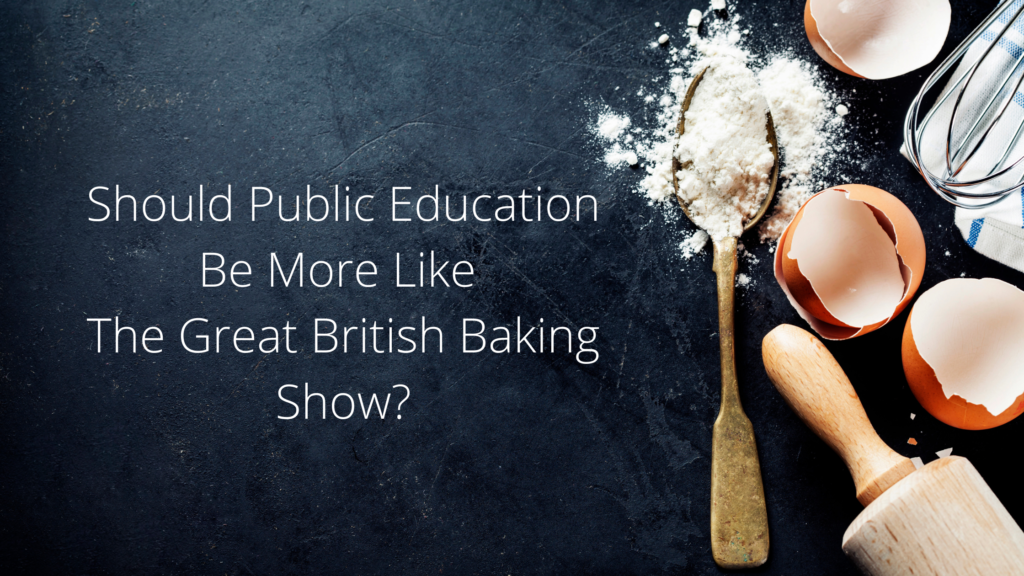
This is reposted from The Achievement Plateau, written by Rob Berretta
- With shorter days, impending holidays, and accumulating stress at work, I’ve returned to one of my favorite indulgences: The Great British Baking Show.
- If you’ve never watched the show, I’m sorry, (get on Netflix now and watch it), and here’s a brief synopsis. Basically, a bunch of amateur British bakers compete in three baking challenges during each hour-long show, with one baker getting eliminated at the end of each show until one is crowned “UK’s Best Amateur Baker.”
- The baking often takes a back seat to the charming personalities and backstories of each baker, along with the direct-yet-gentle feedback the judges levy upon them.
- More importantly, I think there’s an education analogy baked into the show. And that’s what I want to explore today: the lesson(s) can we glean from this wonderful piece of culinary entertainment.
- Each show contains three segments: the signature bake, the technical bake, and the “showstopper” baker.
- In the technical bake, well-practiced amateur bakers are handed a skeleton recipe — often missing precise ingredient measurements, baking times, or all the details of a particular step — and must use their technical baking knowledge to produce something beautiful and delicious.
- Most fail. Baking is a complex endeavor, a mixture of art and science as much as sugar and butter. Air temperature and humidity can affect baking times. Bakeware can have subtle effects on the finish of a sponge cake. When bakers are presented a new, unfamiliar recipe, they have to use their knowledge and skills to fill in the gaps. Even for well-practiced bakers, this often results in inedible or unpleasant-looking baked goods.
- The same phenomenon occurs in classrooms all around the country with the “recipes” we give teachers. Surprising as it might be, curriculum, even well-written ones, don’t often contain explicit, step-by-step instructions for what to teach. Precise instructional moves to maintain cognitive engagement, check for understanding, and lesson pacing are often omitted or left intentionally vague. Teachers are expected to fill in the gaps using their knowledge and skills. But, even for well-practiced teachers, this often results in “inedible” lessons.
- Why? There are myriad reasons. First, teachers are often asked to bake several brand new lessons every day. A self-contained (teaches every subject) elementary school teacher could be baking up to five or six new recipes each day. When I taught second grade way back in 2004, I remember flipping through the teacher’s guide of the basal reading program desperately trying to figure out how to introduce the text, which background knowledge to connect, and which questions I should ask during the reading. And that was before I looked through the math guide, unpacked the FOSS kit for science, and tried to assemble a coherent social studies lesson from scratch (because no one ever bothers to provide us with social studies curriculum). It’s fair to say most of my lessons were inedible at best. Should we ask teachers to master fewer recipes each day?
- In the technical bake, the bakers are often presented with a recipe for a baked good they’ve never before encountered, like Maids of Honour (mmm, curd cheese). The same happens with curriculum. We often change curriculum so frequently that teachers are forced to teach lessons they’ve never before seen taught. Ideally, curriculum writers would provide teachers with lesson “exemplars,” model lessons that teachers could watch and then riff off of to adjust to the tastes and needs of their students.
- The final segment of each GBBS is the signature bake, the segment of the show where they present their “tried-and-tested” baked items. These are recipes they’ve attempted and perfected repeatedly at home. Not surprisingly, most bakers excel in this segment, producing something edible and pleasing to the eyes.
- I wonder if we could do something similar in education. Maybe we just need to pick a curriculum and stick to it, allowing teachers to try and test their lessons over many years. After all, teaching, like baking, is a complex endeavor: a mixture of art and science.
- There’s one other lesson from the GBBS that I think we in public education could borrow: the direct-yet-gentle feedback. But’s that a recipe for an entirely new post.

